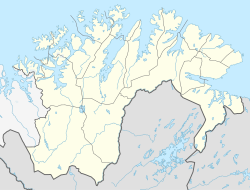King Oscar II Chapel
| King Oscar II Chapel | |
|---|---|
| Kong Oscar IIs kapell | |
 View of the church | |
| 69°47′06″N 30°48′44″E / 69.7849°N 30.8121°E | |
| Location | Sør-Varanger, Finnmark |
| Country | Norway |
| Denomination | Church of Norway |
| Churchmanship | Evangelical |
| History | |
| Status | Chapel |
| Consecrated | 26 September 1869 |
| Architecture | |
| Functional status | Active |
| Architect(s) | Jacob Wilhelm Nordan |
| Completed | 1869 |
| Specifications | |
| Capacity | 72 |
| Materials | Stone |
| Administration | |
| Diocese | Diocese of Nord-Hålogaland |
| Deanery | Varanger prosti |
| Parish | Sør-Varanger |
King Oscar II Chapel (Norwegian: Kong Oscar IIs kapell) is a chapel in Sør-Varanger Municipality in Finnmark county, Norway. It is located in the village of Grense Jakobselv. The chapel is part of the Sør-Varanger parish in the Varanger deanery in the Diocese of Nord-Hålogaland. This stone chapel was built in 1869 around 500 m (1600 ft) from the border with Russia. The chapel was designed by Jacob Wilhelm Nordan and it seats about 72 people.
History

In 1851, the Norwegian settlement in the Grense Jakobselv area had a strong desire to have its own chapel. However, it was politics that would accelerate the work of construction. In 1826, the demarcation of the Norway–Russia border was completed. However, there were still disagreements between the Norwegian authorities and Russian fishermen on the national border (the Jakobselva river) after that time. After reporting several harsh confrontations between Norwegian and Russian fishermen, the county Governor of Finnmark wanted to let a naval ship from the Royal Norwegian Navy to undertake fisheries surveillance during the months with the heaviest fishing. The Interior Department wanted an independent investigation of the circumstances and sent Lieutenant Commander Heyerdahl north to familiarize themselves with the case. Heyerdahl did not share the county Governor's views on which solution. He proposed instead to erect a chapel at Grense Jakobselv. A Lutheran chapel would be an indisputable boundary marking, such as the Russian Orthodox chapel in Boris Gleb that had been used for border demarcation in 1826. In 1865 it was decided to build a chapel and parsonage at the border. In the summer of 1869, the new chapel was built and on 26 September the same year, the chapel was consecrated by Bishop Waldemar Hvoslef.[1]
Name
In 1873, King Oscar II visited the chapel, and to commemorate this visit, he bestowed this chapel with a marble slab with the bilingual inscriptions: Kong Oscar II hørte Guds ord her den 4de Juli 1873 (Norwegian language) and Gonagas Oscar II gulai Ibmel sane dobe dam 4 ad Juli 1873 (Northern Sami language) which means "King Oscar II heard the word of God here July 4th, 1873". At the same time, he expressed a desire to name the chapel after him, and so the members of the congregation made a name plate for him that still hangs over the door.[1]
See also
References
- ^ a b "Kirker i Sør-Varanger sogn" (in Norwegian). Vadsø prosti. Retrieved 2013-03-07.
External links
![]() Media related to Kong Oscar IIs kapell at Wikimedia Commons
Media related to Kong Oscar IIs kapell at Wikimedia Commons

